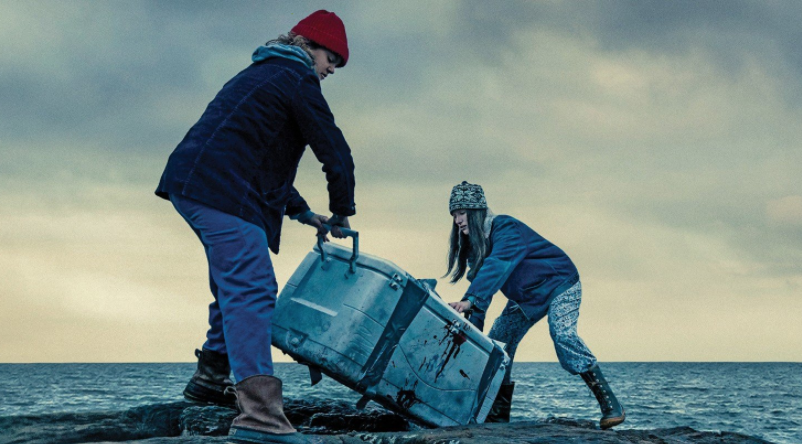With a title that plays on an old English “sea shanty” (a.k.a. “work song”), Blow the Man Down offers a controlled buildup to the ways in which repression can explode, particularly on the part of women told their entire lives to “be good,” docile–to never arouse the tempers of men. As the writing and directorial debut (feature film-wise) of Bridget Savage Cole and Danielle Krudy, the script was cultivated over a period of roughly eight years. And the final product tells the subtle tale of the quiet war waged against the silence that goes hand in hand with patriarchal institutions and their violent byproducts. Centered on the Connolly sisters, Priscilla and Mary Beth (Sophie Lowe and Morgan Saylor), and the recent death of their mother (who suffered from cancer), the “sleepy” town of Easter Cove (a fictional place, actually filmed in the picturesque Harpswell), Maine serves as the backdrop of faux tranquility with rage and resentment lurking just beneath the surface. In this regard, it’s very much like the sea that surrounds it.
Opening with a fisherman singing “Blow the Man Down” in that eerie a capella way that apparently only fishermen can capture, we’re immediately given the sense that there is to be a layered meaning to the phrase. Originally intended to refer to the rough winds that might capsize a man’s ship, in Easter Cove, it applies to the oppressive acceptance of a long-standing brothel called “Oceanview” (located near no such view). Run by quintessentially “tough Irish broad” Enid Devlin (Margo Martindale), Oceanview’s reign remains proof not only that the mentality of the town has been stuck tragically in the past, but that women are just as much capable of being misogynists as men (see also: The Assistant), thanks to the time-honored tradition of brainwashing in all facets of their existence to convince them that they’re somehow inferior, lesser than–the playthings of men.
Mary Beth, the youngest of the Connolly sisters, doesn’t want any part of this–not the subjugation, the town or its undeniably retro flavor. Feeling she’s served her time by taking a year off from school to come back and help Priscilla take care of their mother, she’s all too ready to flee. Particularly after she learns from a gossipy “mourner” at the wake that they’re going to lose their house because their mother owed pretty much everyone a debt by the end.
Appalled by Mary Beth’s selfishness at so easily abandoning her when she’s trying to keep the fish shop her mother owned afloat, Priscilla tells her she’s free to leave now that their matriarch is dead. Mary Beth storms out of the house and into the arms of a skeevy bar patron named Gorski (Ebon Moss-Bachrach, who has perhaps only ever played a “nice guy” in Mona Lisa Smile). Liking his chip-on-shoulder style, and ignoring his bizarre claim that he’s just won the lottery, she drunkenly drives his car back to his dock-located abode (never trust a man who lives on the docks) while he snorts coke in the front seat. Of course, as David Lynch taught us long ago in Twin Peaks, anyone involved with cocaine is batshit crazy, and Mary Beth intuits this much when she sees some telltale serial killer accoutrements in the trunk of his car.
This discovery sets off a chain of events from which the Connolly sisters can never return, going down the path of murder and concealment of said murder with even more resolve than Lady Macbeth. After all, the police are men–Irish Catholic men, at that. The potential of them having any empathy for the circumstances surrounding Gorski’s death seems more unlikely than the ceasing of global warming. What’s more, the police are in Enid’s back pocket (something the sisters are not initially aware of), because no one loves a prostitute more than a cop. In fact, the entire reason Oceanview was started by Enid and the Connolly girls’ mother was to curb the effects of Easter Cove being a port town back in the day. Anyone familiar with port cities is aware of their inherent dangers, attracting thieves, droogs and knaves of every variety. Accordingly, there was a point in Easter Cove’s history when the raping of women was so frequent and unavoidable that the necessity of a whorehouse seemed the best way to keep unwanted male advances at bay.
In the present, however, with libidos curbed even in the most “boring” of places thanks to screen culture, Oceanview feels increasingly like a relic as passé as patriarchy itself. And the three women who were once advocates and friends of Enid’s “cause,” Susie Gallagher (June Squibb), Gail Maguire (Annette O’Toole) and Doreen Burke (Marceline Hugot), feel they have no choice but to band together to take down the last bastion of chauvinism once and for all.
Enid, of course, sees their contempt for her business as stemming from a place of prudishness and faux righteousness when, in fact, all they want is a better existence for the women of Easter Cove’s future. As they phrase it to Enid, “They’re not our daughters, but they’re somebody’s daughters.” And that should mean something to any woman who wants to put a stop to how her gender is objectified… unless, of course, she herself is profiting from that objectification.
With its careful storytelling and attention to scenic detail as a mirror of people’s behavior in the town, the film bears the seriousness of subject matter that Manchester by the Sea wished it could convey with half as much genuineness–thanks in part to the necessary tinge of dark comedy. Indeed, Blow the Man Down is an instant classic in the archives of distinctly “New England” cinema.




















